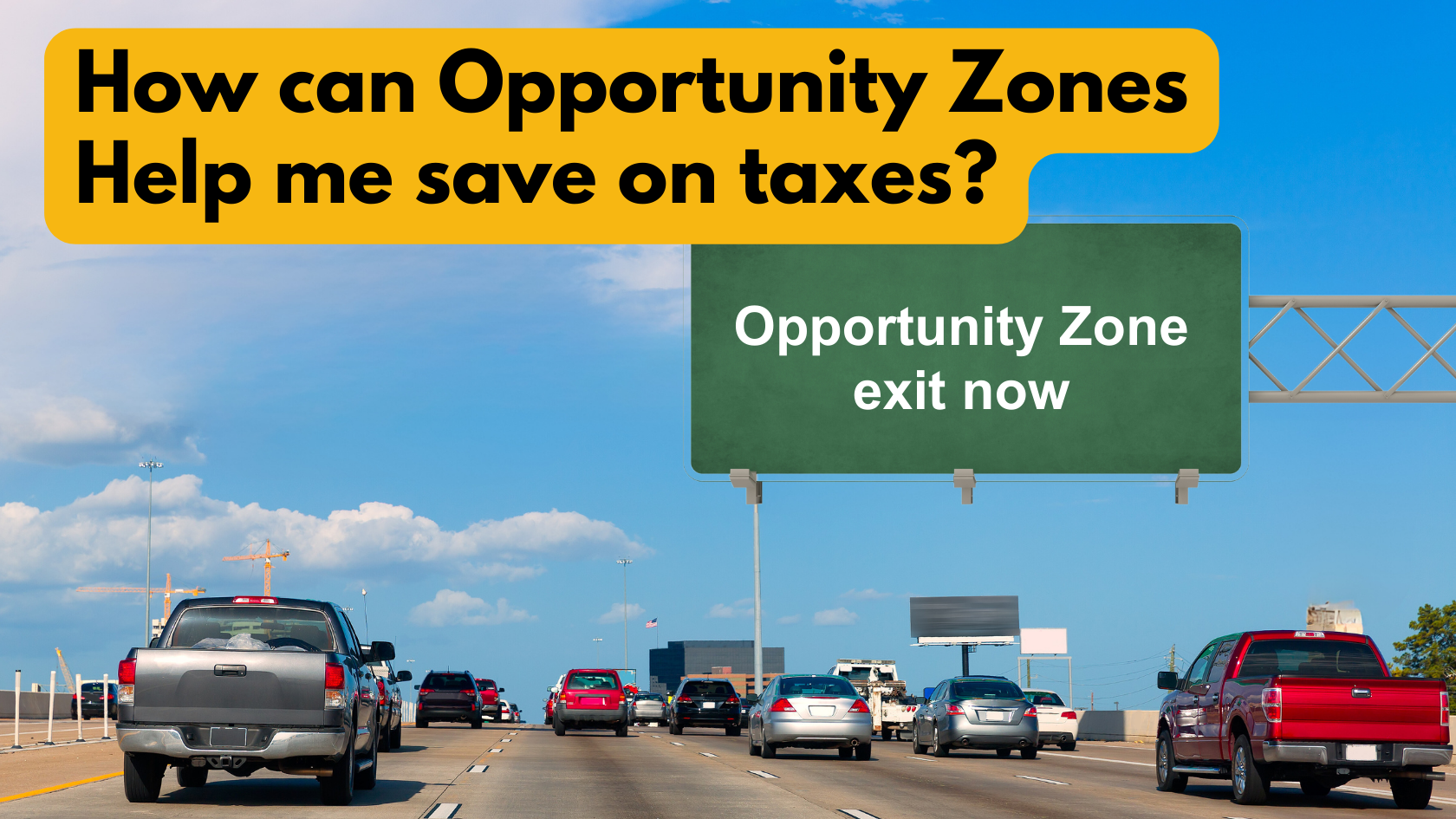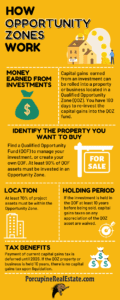Porcupine Real Estate Blog
How can opportunity zones help me avoid taxes?

An opportunity zone is a designation from the federal government given to certain economically distressed areas throughout the United States, with the goal of encouraging investment and development in those areas. The program provides tax incentives to encourage those with capital gains to invest in low-income and undercapitalized communities.
History of Opportunity Zones
The designation was created as part of the Tax Cuts and Jobs Act of 2017 and the areas generally represent economically distressed communities that are in need of investment and revitalization. The purpose of opportunity zones is to spur economic growth and create jobs by incentivizing investment in these regions.
Any corporation or person with capital gains can qualify and you can use your funds to finance commercial and industrial real estate, housing, infrastructure, and existing or start-up businesses.
Opportunity Zone locations
Qualified opportunity zones were defined as census tracts with a poverty rate of at least 20% or a median family income that is less than 80% of the surrounding area.
Opportunity zones can encompass a wide range of areas, from urban neighborhoods to rural communities, and can include everything from commercial real estate projects to startups and existing businesses.
The idea behind the program is to incentivize investment in areas that may otherwise be overlooked and underinvested, in order to help revitalize those communities and create jobs and economic growth.
You can view a list of qualified opportunity zones in New Hampshire here.
The benefits of Opportunity Zones
The main tax benefit of qualified opportunity funds is that you can defer tax payments on capital gains realized from prior investments.
If you’re an investor who puts money into a designated opportunity zone, you can receive certain tax benefits, including a temporary deferral of taxes on capital gains and potential tax-free treatment of future capital gains on this investment.
If you are facing a significant tax liability as a result of capital gains, investing in a Qualified Opportunity Fund may be worth exploring, provided you invest within a set amount of time.
The caveat to this is that the capital gains have to be allocated to the qualified opportunity fund within 180 days from the sale date. By doing so, you can defer tax payment on the gain until the opportunity fund is sold or December 31, 2026, whichever comes first.
What’s the difference between an Opportunity Zone and a 1031 exchange?
When a real estate investor sells an investment property, they can roll the capital gains into a 1031 exchange, which will then be rolled into a new investment property, indefinitely deferring capital gains taxes and depreciation recapture.
Opportunity zones, on the other hand, are not limited to gains on real property and are open to any investor facing a capital gains tax bill.
This means that people who have taxable gains from the sale of assets such as stocks and bonds, cryptocurrencies, gold and silver, and real estate investments, can receive benefits now and over the next several years by investing in an opportunity zone.
How it all works
In order to get tax incentives, you’ll need to contribute proceeds from the sale of taxable assets to a qualified opportunity fund (QOF), a specific vehicle designed to invest in opportunity zones. Once designated as QOF, the fund needs to make over 90% of its investments in QOZ.
Investing in QOF allows you to defer tax on capital gains until the earlier of the sale or exchange of the QOF investment or 12/31/2026.
Another benefit is that, for capital gains placed in Opportunity Funds for at least 5 years, your basis on the original investment increases by 10 percent. If invested for at least 7 years, your basis on the original investment increases by 15 percent.
The BIGGEST incentive
Perhaps the biggest incentive to investing in QOZ is how the investment in the QOF is taxed once you sell your interest in the fund. If you invest the entire capital gains in QOF and hold the investment for 10 years or more, the investment “basis” in the QOF is increased to fair market value on the date of sale or exchange.

Still not convinced? There’s more
In addition to the tax benefits, there are many other reasons why you should consider investing in opportunity zones.
First off, these areas are often overlooked by traditional investors, so there may be potential for growth and profitability.
And investing in opportunity zones can help revitalize struggling communities, creating jobs and economic activity in areas that could benefit most.
Details you need to know
In order for the property to qualify as a QOZ it must be original use or substantial use. Original use includes ground-up construction and development, properties that have been vacant for at least 3 years prior to the purchase, properties that have been vacant for at least one year before the QOZ was designated, and all brownfield sites (provided improvements are made that meet health and safety standards).
To qualify for substantial improvement of a property, you must double your adjusted basis in the property during the 30-month period you hold the property and the adjusted basis does not include the value of the land.
For example, if you buy a property for $10 million, $6 million is allocated to the building value. In order to qualify for substantial improvement, you’ll need to spend at least $6 million improving the property.
What’s the downside?
All investments carry some risk and opportunity zones are no different. Some of the QOZ areas may be struggling for a reason, whether it’s crime rates, infrastructure, loss of a major employer, or a lack of skilled workers.
You also must substantially improve the property during the first 30 months of owning it. That is, you will need to increase the value of the property by at least the amount you paid for it.
And the tax benefits for deferral of current capital gains event tax liability with opportunity zones are set to expire in 2026, so you’ll need to consider their exit strategy.
What about if I want to buy a home in a QOZ?
Homebuyers usually can’t take advantage of the tax incentives that come with opportunity zones unless they make considerable upgrades to the property they buy there.
Qualified opportunity zones incentivize investors to invest in communities that need it. It’s a win for the communities and a win for the investors.
DISCLAIMER: This is a complex program and you should always consult with your tax professional or attorney before making an investment in an Opportunity Zone Fund.

